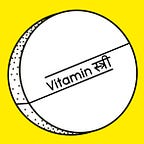Where Do Our Ideas of Love Come From? | Valentine’s Day
Why Do We Think of Love the Way We Do?
Love. That one feeling which writers, philosophers, intellectuals, and all of us with a Tumblr account in the 2000s have tried to define. But despite our maybe unsuccessful attempts at defining love, there is thankfully some consensus on how we all experience love. Or think we experience love. Why?
This Valentine’s Day, Vitamin Stree is doing a deep dive into what the world tells us what love is, and where do these ideas come from? What’s the science behind us hearing violins when we meet the love of our life? Or the logic behind our most loved rom-coms, despite us knowing that the last-minute airport dash is so silly? (What about phones, hello!)
If love makes the world go round; how does the world make love sound?
If music is the food of love, play on!
You know what I’m talking about. The moment you fall in love, you know you’re supposed to hear violins somewhere. Some love songs make us feel like all we want to do is find The One. While some make us feel heartbreak that we might not even have experienced. (We’re looking at you, Adele.) And there’s science behind why love songs, and some musical sounds, make us feel the way they do. Like if love was a symphony.
Studies show that listening to music releases dopamine in our brain, which makes us happy. Basically, our brain is responding to emotional peaks when we listen to music.The rhythm of the music enthralls us, and often, the brain recognises the patterns which make music as speech.
Similarly, singing can also cause the release of oxytocin, or the cuddle hormone. You know how you feel a chill when you listen to John Mayer crooning “We’re Slow Dancing in a Burning Room?” Those chills? They have a scientific name. Frisson. And that’s your body giving a physical response to music. A study published by Wesleyan University’s psychology department goes deeper into that feeling which it calls “skin orgasms.” So that feeling that a song can make you fall in love? That’s what it can be! Basically, music sets up sonic patterns in our brains, where we start expecting…something to happen. Which, if we’re right, can feel a lot like dopamine. Or, a lot like love.
That filmy-waala love!
Then of course, there are all the romantic ideals we’ve built up through films. We all long for a filmy love story; or at least a good enemies-to-lovers arc. But are there some rom-com tropes that work better than us? And how much does love and romance that we see in films influence our ideas of love? (Like, the universal favourite, dash-in-the-airport walaa love.)
One reason is we all love a good cry. The reason sappy-romantic films do as well as they do, despite a dismal critic verdict sometimes, is because they are…sappy-romantic films that allow us to have a good cry! According to a New York-based psychotherapist, watching such films can release stress hormones which calm viewers, and also give them space to confront uncomfortable feelings. Like heartbreak or loss. These films also bring up a lot of deep, emotional questions — What is life?
What is love?
And what we see of love in movies and TV shows shapes up our ideas of love. According to a study by University of Michigan, “It is possible that frequent exposure to romance and courtship in this idealized form could lead viewers to adopt equally idealized notions about relationships in the real world.” So maybe we do think that we will find a love like Celine and Jesse in “Before Sunset’! Or have our own romantic co-workers to lovers arc!
In fact, seeing rom-coms, which more often than not, undermine women can give us wrong ideas about what a “romantic gesture” is! Have you heard of the Dobler-Dahmer theory? According to this, a simple test to see whether a romantic gesture is really about love, or just plain creepy, is to see if the person on the receiving end of the gesture is romantically interested! Hmm, we don’t think Kabir Singh passes this test, right?
When love in fiction is all you need
Whether it’s Jane Austen’s Mr Darcy or Anuja Chauhan’s Dylan Singh Shekawat, books have given us love stories that make us swoon, and sigh. But is a bookish conception of love, getting outdated? Especially, with fluid definitions of queer love?
Some say that romantic love in books, has created such an unrealistic idea of love, that it has “ruined what love feels like.” Which is often less clumsy, and sunset-filtered, and more difficult and laboured. But when we go to romance novels, we go looking for love, but also crucially, love that centers women’s stories and their lives! Now, if we find that no man in flesh-and-blood can compare to the charms of Mr. Darcy, are we to blame, or Jane Austen’s genius?
Conclusion
What do you think of when we say “love”? Chances are whatever your answers are to that question, they are influenced by what popular culture has told you about love. Sometimes, we apply those lenses to our lives, and sigh in frustration. And sometimes, if we’re lucky, real-life love, exceeds what we built up in our head. And till we have a knight-in-shining-armour rescue us, we always have ourselves to fall in love with right? Maybe with a Yashraj song in the background?
